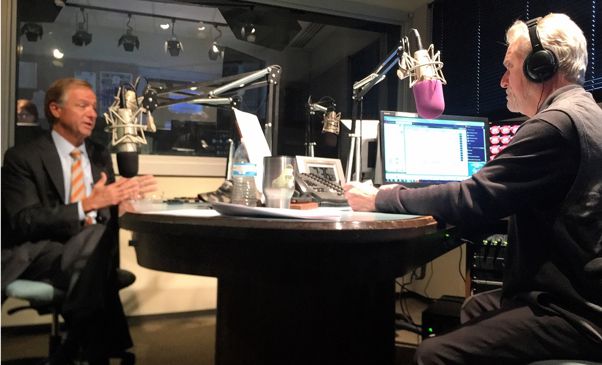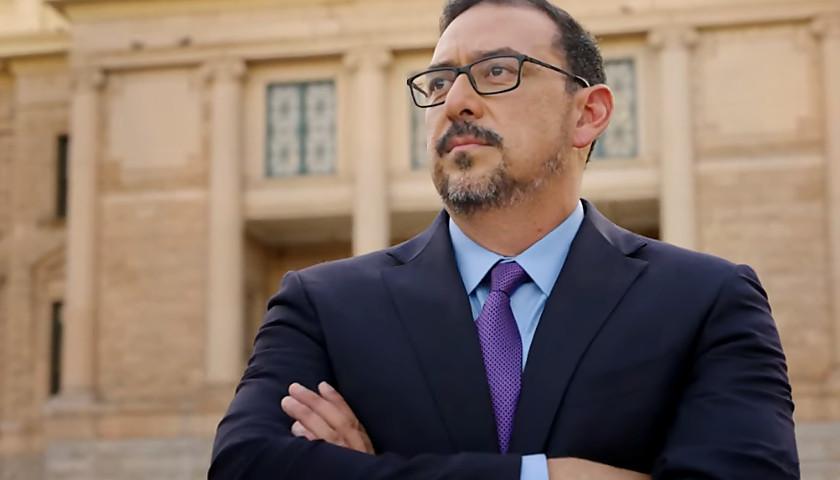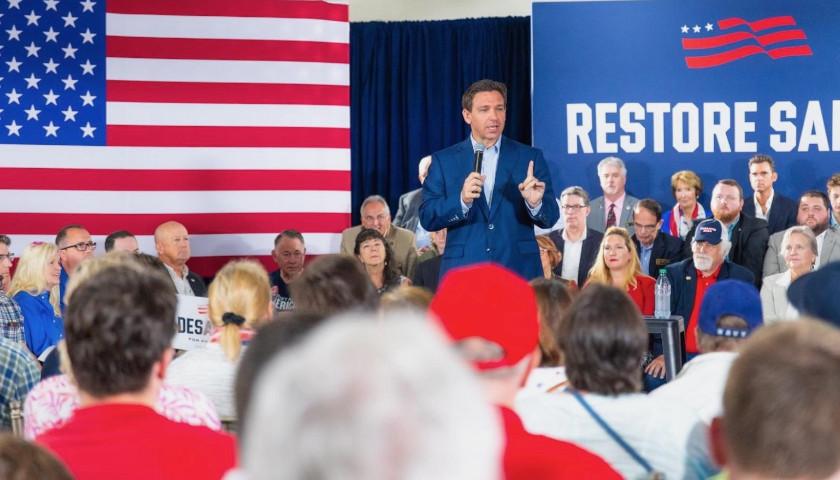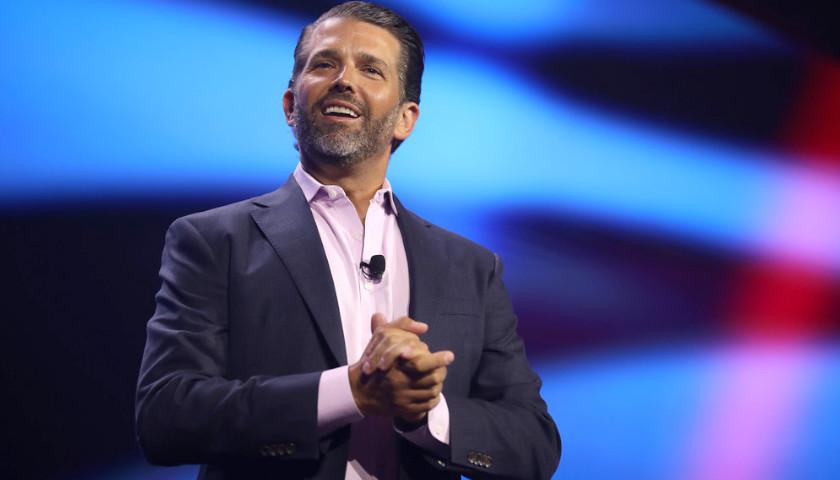One day after he announced his proposal to increase the tax on gas by 7 cents, from 21 cents per gallon to 28 cents per gallon, Gov. Bill Haslam gave an exclusive in-studio interview to Ralph Bristol, host of Nashville’s Morning News on 99.7 FM, WWTN, on January 18.
Haslam made the case for his gas tax proposal, which he elaborated on in his “State of the State address” at the Capitol on January 30, which the General Assembly is now considering.
“Can you legitimately bring that [Hall Income Tax cut] forward to balance now against the gas and other tax increases to make it an even balance?” Bristol asked to begin the interview.
“Sure. Let’s start here,” Haslam answered.
“Our administration and the legislature has already cut $270 million in taxes. The most any administration or legislature had ever done before was $60 million. We’re proposing another $270 million cut in this budget,” the governor continued, adding:
Your point is we already cut the Hall Tax last year.
But we didn’t. We passed a bill to do that. It still has to come out of the budget.
It’s like you and your spouse saying were going to make a pledge to go on a trip every five years to celebrate, and we’re going to Hawaii.
You might have signed the covenant to do it with each other, but you still have to find a way to pay for that, and take it out of your budget. We haven’t done that.
Passing a bill doesn’t take the money out of the budget, and that’s key to remember.
That’s how Washington does it. It’s not how we do it here.
“The other potential problem is you’re raising a gas tax which goes on everybody. You’re mainly lowering business taxes, so the tax increase may effect more people disproportionately than the tax cut,” Bristol noted.
“Well, start here. Tennessee today is the lowest tax state as a percentage of income for individuals in the fifty states,” Haslam responded.
“We should be celebrating where we are. We’re the lowest tax state of the fifty, ok? Business taxes unfortunately, that’s not true, we’re like the third highest,” the governor stated:
And so we have to be competitive.
One of the things that people want to make sure Tennessee is a place to providing job opportunities for their kids and their grandkids and themselves.
Right now we’re not competitive.
Of all people, folks like you, who undersand the impact of tax policy, should realize we don’t want to chase people away by being on the high end of business taxes, which is where we are now.
You can listen to the interview here.
Here’s a full transcript of the interview:
Bristol: You rolled out your very elaborate plan yesterday. We’ve already met and talked about this so you know what my concerns are.
But the people haven’t heard your explanation for those yet.
Briefly, when we passed the Hall Tax cut last year that was meant to be a simple tax cut.
Now, there was some hesitation to do it, thinking that maybe we wanted to save it and balance it against a gas tax, but that didn’t happen, they passed a straight forward tax cut.
Can you legitimately bring that forward to balance now against the gas and other tax increases to make it an even balance?
Haslam: Sure. Let’s start here.
Our administration and the legislature has already cut $270 million in taxes. The most any administration or legislature had ever done before was $60 million.
We’re proposing another $270 million cut in this budget.
Your point is we already cut the Hall Tax last year.
But we didn’t. We passed a bill to do that. It still has to come out of the budget.
It’s like you and your spouse saying were going to make a pledge to go on a trip every five years to celebrate, and we’re going to Hawaii.
You might have signed the covenant to do it with each other, but you still have to find a way to pay for that, and take it out of your budget. We haven’t done that.
Passing a bill doesn’t take the money out of the budget, and that’s key to remember.
That’s how Washington does it. It’s not how we do it here.
Bristol: But it promised that tax cut and the people were depending on that. They weren’t told they were going to have to raise any other taxes to get that tax cut.
Haslam: We’re not saying you have to raise any other taxes to get that tax cut.
Bristol: The other potential problem is you’re raising a gas tax which goes on everybody. You’re mainly lowering business taxes, so the tax increase may effect more people disproportionately than the tax cut.
Haslam: Well, start here. Tennessee today is the lowest tax state as a percentage of income for individuals in the fifty states.
We should be celebrating where we are.
We’re the lowest tax state of the fifty, ok?
Business taxes unfortunately, that’s not true, we’re like the third highest.
And so we have to be competitive.
One of the things that people want to make sure Tennessee is a place to providing job opportunities for their kids and their grandkids and themselves.
Right now we’re not competitive.
Of all people, folks like you, who undersand the impact of tax policy, should realize we don’t want to chase people away by being on the high end of business taxes, which is where we are now.
Bristol: But we can do both. Most people think we can do both anyway. The surplus is so big and the rainy day is exactly where it is right now.
You could cut another $100 million on the food tax and still have plenty of money to spend in Tennessee and then it wouldn’t raise those pesky questions that I just asked.
Haslam: So let’s talk about that.
You’re right on target.
To understand decisions, you really have to understand the budget, and Tennessee’s budget is a $33 billion incredibly complex deal.
Think of it this way.
Everybody thinks a billion dollars is just sitting in a drawer and it doesn’t have any claims on it. But that’s really not how it works.
Here’s the best way to explain.
Typically in a new year, we have about $400 million of new revenue to distribute that isn’t already being used somewhere.
Bristol: $400 million more than the previous year?
Haslam: Exactly. This year were going to have $950 million to be exact.
But it’s not just sitting out there without claims.
This tax cut will take about $215 million of that.
That’s back to the thing about the Hall Tax cut. It’s got to come out of somewhere.
BEP K-12 Education will cost us another $200 million this year to meet the formula requirements and to give pay raises to teachers.
Tenncare will cost us another $150 million this year above what it did last year. New drug benefits and Medicare Part B . . . I won’t take all our time to go into that.
Higher education to meet the complete college formula, which we agreed to as a state, will cost us another $80 milllion a year.
State employee salaries, if we want to give a raise, and health insurance increases–our health insurance goes up just like everybody else’s does–is another $100 million.
We have obligations to retirees to meet the pension plan, and the actuaries say to meet the actuarilly required contribution will be about another $50 million this year.
We have a $1.2 billion liability for health care for retirees that will cost $60 million, so there’s another $110 million.
I’m also going to propose we put some regular money in towards capital maintenace of buildings so we don’t let them get behind in bad years
I just went through just there of that $950 million, there’s about $900 million of that claimed, and that’s before we do any new program anywhere.
Bristol: But if you’re saying ‘I can’t cut another $100 million in food tax,’ what you are also saying is ‘Boy, if we were only getting another $800 million instead of $900 some million more this year than last year we’ld be in real trouble.’
Would we? That sounds a little bit unbelievable.
Haslam: No. All the numbers I gave you are verified. I’ll be glad to show you the budget.
Bristol: But some of them are controllable, right?
Haslam: We don’t have to give raises to teachers or to employees.
A lot of these are not controllable.
The BAP formula to fund that is what it is. Complete college is what it is.
Tenncare, we have to fund those increases.
So you’ld say, ‘Well, how have you been making it when you didn’t have this money?’
We’ve been doing it by cutting expenses.
And so we’ve cut $550 million out of government, way more than anybody ever has before, to make that work in the past.
This year we have some options because of that.
Bristol: By the way, may I stop you for a second? I don’t think anybody has suffered as result of the $500 million spending cut that you have enacted. I don’t notice any fewer government services. Maybe some other people do.
But I think you’ve proven you can cut spending without it being a major concern to the people of Tennessee.
Haslam: I agree in part, although there are a lot of people that depend on state government in a way that a lot of us are fortunate not to have to. Thats number one
But number two, I actually agree with your point.
I always say its amazing how little government people will miss when it’s gone.
But there are real services people need.
Having said that, so what are we doing with this extra $550 million?
Well, about half of that we’re giving away in tax cuts, and others we’re making decisions about raises for teachers and other things that we think are critically important for the future of the state.
Bristol: Are we sure there’s no waste in transportation funding? I get calls all the time from people saying it seems to me they’re spending a lot of money.
Haslam: We have historically one of the better rated road systems, and we pay the third least per mile.
Is there some waste out there? Sure.
But we’re talking a minimal amount of money and we have folks that are squeezing dimes to make it work.
We cannot keep funding roads the way we are.
The Compost Report said that what was 21 cents per gallon when last advanced in 1988 is now 11 cents.
That’s just a fact. We’re literally driving on our roads for half of the cost of what we used to.
Bristol: You might get challenged on that, I’m not sure, I just saw this yesterday. I’ve never seen this before.
A little booklet produced by the House and the Senate Ways and Means Commitee. It’s all jammed full of figures.
It had one chart that showed the cost per mileage of road construction over the last six or seven years, and it hasn’t changed hardly at all. Is that misleanding?
Haslam: There’s two things. Actually, it has.
You can go talk with highway officials and local or state government officials.
The cost to pave a mile of road has actually increased substantially in that 29 year period, so that’s number one.
Number two, remember, this part of the lessened impact of the road tax is this: as your car gets better mileage, you pay less to drive on the road. That’s a good thing, but as you go from 15 miles per gallon to 30 miles per gallon you’re literally paying half as much.
And then inflation. Every other tax goes up with inflation.
Because gasoline is a cents per gallon, it doesn’t move when price moves.
Bristol: Small wonkish question. Why is $97 million going from the transportation fund going to debt service which is mostly for college buildings?
Haslam: It actually doesn’t. It actually goes out of that, but that does make its way back into the budget
Bristol: OK, so that’s misleading.
You laid out how much this will accomplish over a period of time and it looks like within the next six years or so we’ll have almost all of the backlog of projects at least started by that time if you get this extra money.
Haslam: That’s right, What you have to remember, don’t lose in this, we’re talking about 952 specific projects in 95 counties.
Also not to be forgotten is a lot of this money goes to local government. So county governments will get $78 million and cities will get $39 million.
That’s how they pave the roads in your neighbordhood. That’s how they fix that local bridge.
We have a lot of counties, particularly some of our rural counties, that literally are having to raise property taxes because they’re having to take that road money out of their general fund.
Bristol: Are you still open to other ideas? I know you’ve been working on this for a long time. You’ve talked with a lot of people before you ever put it together.
Haslam: Sure, the beauty of the democratic process is a lot of people get to weigh in on this. That can be frustrating.
As Governor, I’d much rather be king, and say here’s how we’re going to do it. But that’s not how it really works.
We have worked really hard
Let’s deal with budget realities. Lets’ don’t say I hear there’s a billion dollars here that we can use.
Let’s deal with what the budget realites are.
The rest of this picture hasn’t been revealed.
We will present the budget on January 30, then the legislators will be able to have a full understanding of, ok, here’s what they’re proposing to spend the extra money we have on.
How do we balance that with road needs?
Bristol: If you absolutely had to do without another $100 million in order to convince people that this is really a tax swap instead of an overall tax increase and that it is properly and proportionately distributed, could you live without that?
Haslam: Government is all about making choices. ok?
I’d start here. Remember, we’re the lowest tax state in the country.
There’s no reason we should be, right?
We don’t have oil in the ground like Texas, we don’t have beaches like Florida.
If you said, ‘I wonder what state should have the lowest tax rate in the country?’, you probably wouldn’t pick Tennessee.
But we already are, so you have to start with that fundamental reality.
We also are the lowest debt state in the country.
What we’re doing now is working.
We are generating the right amount of income while we cut government.
I would hope we would recognize the path we are on is a really smart one.
Bristol: Governor Haslam, our time on this program is really limited, we’ve already come to the end of it. Don’t be a stranger.
Haslam: I enjoyed being here.





